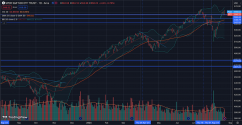Some random club-talking: from Grok search for "largest stock markets in terms of countries":
Based on the latest information available up to August 2024, here are the countries hosting the largest stock markets by total market capitalization:
- United States - The U.S. stock market, primarily through the NYSE and Nasdaq, holds a significant portion of the world's market capitalization, often cited as around 42.5% to 50% of global equity market value. This includes companies like Apple, Microsoft, and Amazon, which contribute massively to its market cap.
- China - China's stock market, including both the Shanghai and Shenzhen stock exchanges, has been growing rapidly. Its market capitalization has been reported around $10 trillion to $11.5 trillion, making it one of the largest in the world.
- Japan - The Tokyo Stock Exchange (TSE) is the third largest in terms of market capitalization, with figures around $6 trillion to $6.5 trillion, featuring companies like Sony, Mitsubishi, and Toyota.
- India - India's stock market, particularly the National Stock Exchange (NSE) and Bombay Stock Exchange (BSE), has seen significant growth, with its market cap reaching around $4 trillion to $5 trillion, making it one of the fastest-growing major markets globally.
- Hong Kong - While often considered part of China's economic sphere, Hong Kong's stock exchange (HKEX) stands on its own with a market cap that has been fluctuating but is generally around $3.9 trillion to $5.6 trillion, thanks to listings of major Chinese companies and global firms.
- United Kingdom - The London Stock Exchange (LSE) typically ranks high, with a market cap around $3.1 trillion, although this figure can vary based on global economic conditions.
- Saudi Arabia - The Tadawul All Share Index in Saudi Arabia has seen significant growth, with its market cap reaching around $3 trillion, driven by oil revenues and economic diversification efforts.
- France - The Euronext Paris (formerly known as the Paris Bourse) has a market cap that has been reported around $3.2 trillion, with major companies like L'Oréal and TotalEnergies.
- Canada - The Toronto Stock Exchange (TSX) is also among the top with a market cap around $2.6 trillion, driven by sectors like energy, mining, and financial services.
- Germany - The Deutsche Börse, particularly the Frankfurt Stock Exchange, has a market cap of about $2.2 trillion, featuring companies like Siemens and Deutsche Bank.
Here is a list of major US public companies in Silicon Valley or on Wall Street,
Market Cap of AAPL: $3417.42 billion
Market Cap of AMZN: $1861.66 billion
Market Cap of GOOG: $2037.48 billion
Market Cap of META: $1344.30 billion
Market Cap of MSFT: $3094.60 billion
Market Cap of NVDA: $3067.65 billion
Market Cap of TSLA: $683.65 billion
Market Cap of TSM: $867.94 billion
Market Cap of AVGO: $764.52 billion
Market Cap of AMD: $246.43 billion
Market Cap of QCOM: $188.83 billion
Market Cap of INTC: $87.14 billion
Market Cap of CSCO: $203.37 billion
Market Cap of ANET: $111.27 billion
Market Cap of PANW: $114.16 billion
Market Cap of JPM: $615.12 billion
Market Cap of BAC: $304.56 billion
Market Cap of WFC: $191.72 billion
Market Cap of C: $115.39 billion
Market Cap of USB: $68.95 billion
Market Cap of GS: $157.19 billion
Market Cap of MS: $162.55 billion
Total market cap of above US companies is 19705.92 billions or around USD 20 trillions. The entire China stock market cap is around USD 10 trillion. In the context of real economy between the two countries, it is either (1) China stock market does not accurately reflect its true economic well being, or (2) US stock market does not accurately reflect its true economic well being.
BTW, the total market capitalization of S&P 500 companies as of August 2024 is approximately $47.073 trillion. This figure represents the sum of the market capitalization of every company listed in the S&P 500 index, based on their outstanding float share count.

